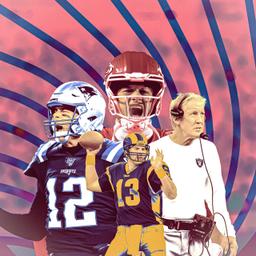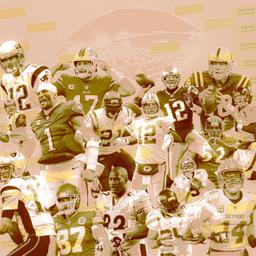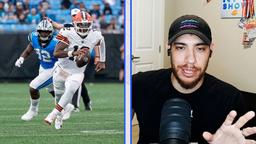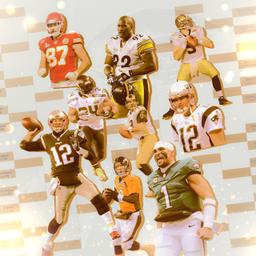We’ve arrived at the Super Bowl to end all Super Bowls. The ultimate battle between immovable object and unstoppable force. The 2013 Seattle Seahawks vs. the 2007 New England Patriots.
This is a dream matchup. Let’s break it down in way more detail than we need to, just because.
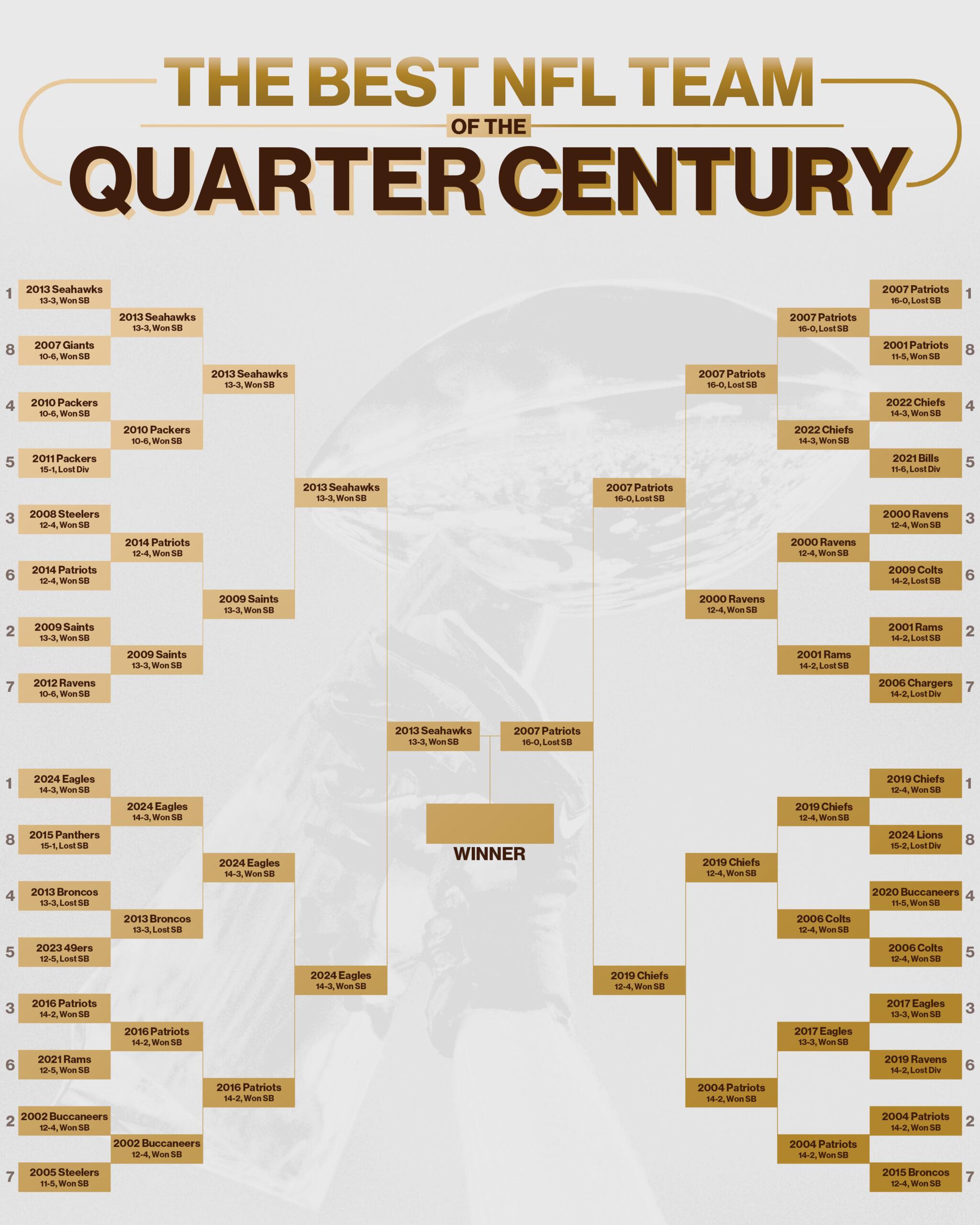
Seahawks Passing Offense vs. Patriots Passing Defense
Set aside the quarterbacks for a second (we’ll get there). If the 2013 Seahawks had a weakness, it was their offensive pass catchers. Golden Tate was the leading receiver for Seattle, with 898 yards. After him, you have Doug Baldwin at 778 and tight end Zach Miller at 387. The Pats’ Asante Samuel would lock down either Tate or Baldwin, and even though the rest of New England’s secondary (Ellis Hobbs, James Sanders, and an aging Rodney Harrison) wasn’t much to write home about, I think that they’d be able to handle this Seattle group.
I see a similar tilt when looking at the blocking matchup. The early 2010s Seahawks were notorious for some mediocre offensive lines, and 2013 was no exception. Meanwhile, the 2007 Patriots ranked second in the league in sacks, with 47. Mike Vrabel made first-team All-Pro that season and recorded 12.5 sacks, and the Patriots could’ve gotten after Russell Wilson even without blitzing.
Advantage: Patriots
Seahawks Rushing Offense vs. Patriots Rushing Defense
Again, the Seahawks just don’t stand out from an offensive line perspective. Pro Football Focus ranked the Seattle offense 19th in run-blocking grade that season. The Patriots weren’t a stellar run-stuffing unit (they allowed 4.4 yards per carry, the 28th-worst mark in the league, but ranked ninth in PFF’s run defense grades), but overall, they appear up to the task of dealing with Seattle’s offensive line. Vince Wilfork could have a nice day here.
But there’s the Marshawn Lynch factor. Seattle’s star running back was at the peak of his powers in 2013, netting 1,573 scrimmage yards and 14 touchdowns. Per PFF, he had 752 rushing yards after contact, second most in the league, and was the second-highest-graded running back that season. Linebackers Tedy Bruschi, Vrabel, and Adalius Thomas would have a busy day chasing after Beast Mode.
Advantage: Seahawks, by a hair
Patriots Passing Offense vs. Seahawks Passing Defense
Now we are into the meat of this matchup. Randy Moss and Wes Welker vs. the Legion of Boom. Every snap would be pure art.
But first, let’s talk line play. Surprisingly, the 2007 Patriots line doesn’t stand out. It ranked 19th in PFF’s pass-blocking grades that season, even though Tom Brady was sacked only 21 times (fifth fewest in the league). Meanwhile, the Seahawks front, led by Michael Bennett and Cliff Avril, was very strong. It had the no. 1 pass rushing group in the league, per PFF. I’m not willing to say that this group was as good as the 2007 Giants unit that ultimately took down the Patriots in Super Bowl XLII, but it’d be good enough to give Brady some of the same troubles he experienced in that game.
In the secondary, we have a matchup of all-time greats. I have no idea how Moss would handle Richard Sherman, Earl Thomas, and Kam Chancellor. Or, should I say, how Sherman, Thomas, and Chancellor would handle Moss. Welker would also be a big factor here, although I think that Chancellor would meet him in the middle of the field pretty effectively.
It seems like there are more players of note on the Seahawks’ side of the ball here, but that doesn’t mean they’d win this matchup. The Brady-Moss connection was just too ludicrously effective in 2007 to say that any secondary could shut it down, even the Legion of Boom.
Advantage: Wash
Patriots Rushing Offense vs. Seahawks Rushing Defense
The Patriots’ rushing offense in 2007 was the mirror to the Seahawks’ passing offense in 2013. Laurence Maroney led the team with 835 yards on the ground. He split starts that season with Kevin Faulk, who totaled just 265 yards (although Faulk added 383 yards through the air). That Patriots team had one of the best run blocking units in the league (second best, per PFF) but didn’t really have the backs to take advantage. I don’t imagine that this matchup would come down to big performances from Maroney or Faulk.
Advantage: Seahawks
Special Teams
Seahawks kicker Stephen Hauschka made 33 of his 35 field goals that season, including 14-of-15 from beyond 40 yards. Meanwhile, the Patriots’ Stephen Gostkowski had a bit of a down year, knocking through just 21 of 24 kicks and going just 3-of-5 in the 40-49-yard range.
As far as returns go, Seattle had lost dangerous return man Leon Washington before the season and made do with the combination of Tate and Jermaine Kearse, among a few others. The unit averaged 11.1 yards per punt return and 21.2 per kick return. The Patriots mostly relied on Welker and Hobbs and averaged 9.4 yards per punt and 25.2 yards per kick.
Advantage: Wash
Quarterbacks
Wilson just did things that Brady never could. The scrambles. The moon balls. And at age 25, Wilson was in his prime as a runner, too, adding 539 yards and a touchdown on the ground that season. He gave the Seahawks offense options and gave opposing defenses migraines.
That said, we’re talking about 2007 Brady here: 4,806 yards, 50 touchdowns, an MVP trophy, and the league leader in every efficiency metric you can think of. 2007 Brady is one of the pantheon NFL quarterback seasons, up there with ’84 Dan Marino, ’13 Peyton Manning, ’18 Patrick Mahomes, et al. You could make the case for this Brady season as the best a quarterback has ever had.
Advantage: Patriots
Coaching
Pete Carroll vs. Bill Belichick. To this day people debate whether Belichick used a Jedi mind trick to get Carroll to throw the football in the closing seconds of Super Bowl XLIX, or whether he committed a strategic blunder by not calling a timeout and saving previous seconds for a potential comeback—one that just happened to work out because of a ridiculous play by Malcolm Butler. It’s difficult to say that either side has a true advantage here, but I guess I’ll go with the guy who has eight Super Bowl rings.
Advantage: Patriots
It seems like it all comes down to how the Seahawks defense would handle the Patriots offense, right? Critically, if the Legion of Boom could stifle Moss and Co. for just long enough on enough snaps for the Seahawks pass rush to get home, we could be in for a game that resembles Super Bowl XLII. But if New England could hold off the pass rush, Brady and Moss could link up for some chunk plays and scoring drives. And I’m not confident that Seattle’s (by comparison) relatively underpowered offense could keep up.
But it’s not just the on-field matchup that we’re voting on. The 2013 Seahawks also won the Super Bowl. The 2007 Patriots didn’t. Maybe that’s the ultimate X factor here. Or maybe it isn’t—it’s up to you to decide.
You can vote here and on Instagram until 6 p.m. ET, at which point we’ll reveal the winner. —Riley McAtee
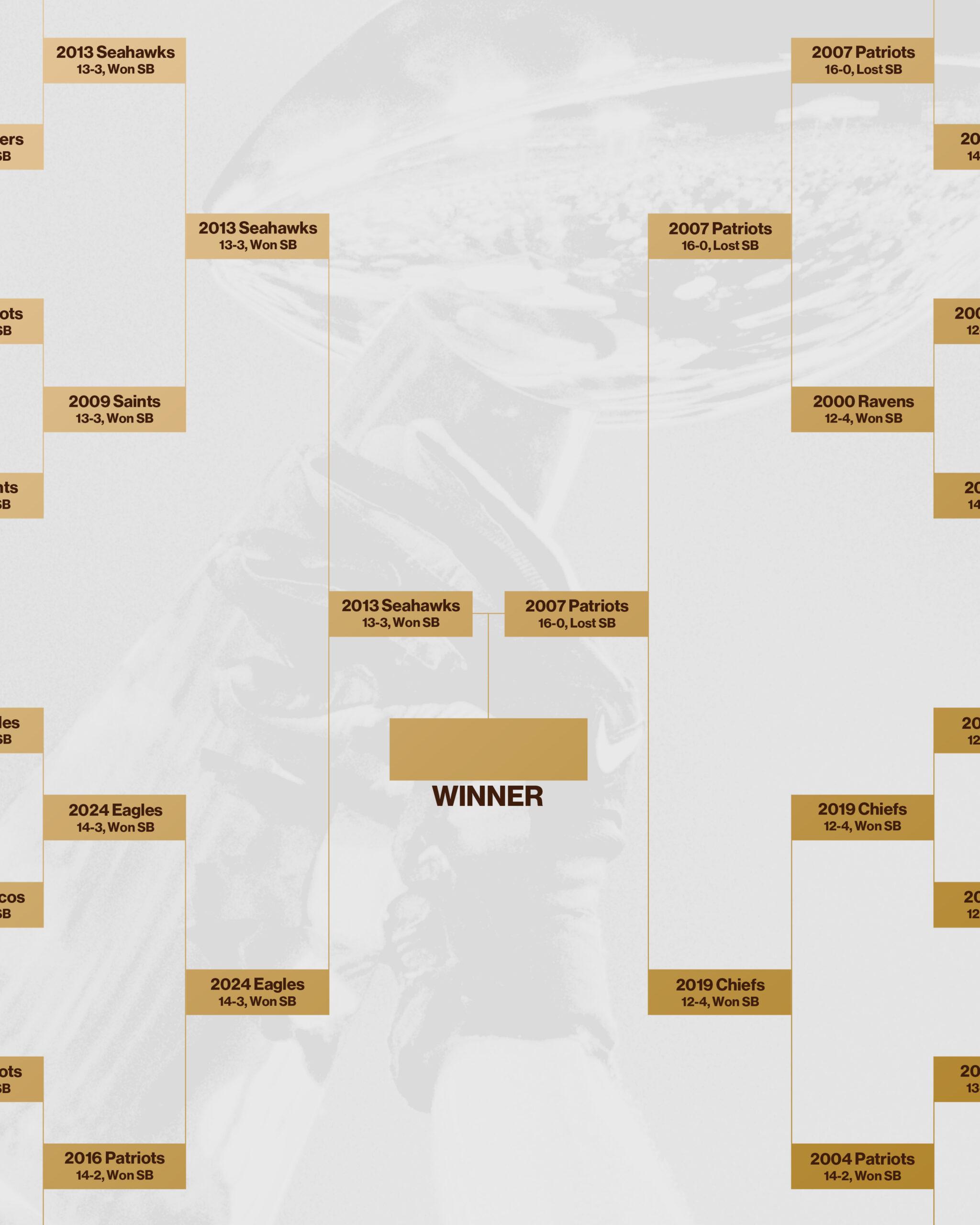
(1) 2013 Seattle Seahawks vs. (1) 2007 Patriots
2013 Seahawks
Record: 13-3
Result: Won Super Bowl XLVIII (43-8 vs. Broncos)
There are a million things I could write about the peak era of the Seahawks Legion of Boom defense, but perhaps the easiest explanation for just how ludicrously good that unit really was is this: On the biggest stage, in Seattle’s 43-8 blowout victory over the Broncos in Super Bowl XLVIII, the Seahawks made league-MVP Peyton Manning and the NFL’s all-time highest-scoring offense look like a bumbling JV squad.
The much-anticipated heavyweight bout quickly turned into a lopsided rout. The Broncos, who had racked up an NFL-record 606 points (37.9 points per game) on the back of Manning’s league-record 55 touchdown throws, were left completely disoriented by the LOB's extraordinarily disciplined, hard-hitting style. The Seahawks forced a failed-snap safety on the Broncos’ first play from scrimmage before picking Manning off on his team’s first and third possessions following the safety—the second, a 69-yard pick-six, made it 22-0 and more or less put the game away before the first half even ended. The trio of Richard Sherman, Earl Thomas, and Kam Chancellor held things down in the back end, bolstered up front by the likes of Bobby Wagner, K.J. Wright, Michael Bennett, Cliff Avril, and a host of others.
That outcome came as no surprise to the uniquely brash, trash-talking Seahawks defense, which had allowed the fewest points (14.4 per game) and fewest yards (273.6 per game) of any team in the NFL that season while generating a league-best 39 takeaways. That unit ranked first in defensive DVOA that year, obviously, and ranks sixth best on the all-time DVOA list. The team’s offense, led by plucky then-second-year quarterback Russell Wilson, carried its own weight, of course, finishing the year tied for eighth in points per game and seventh in DVOA. Wilson paired up with Marshawn Lynch to help reanimate the read option in pro football, and Lynch gave the offense an identity of toughness that rivaled that of their defensive counterparts. Add in the team’s highly efficient special teams group (which ranked fifth in DVOA that year), and it’s clear that the team general manager John Schneider and head coach Pete Carroll built that year will go down as one of the most complete, most fun, and most dominant we’ll ever see. —Danny Kelly
2007 Patriots
Record: 16-0
Result: Lost Super Bowl XLII (17-14 vs. Giants)
The New York Giants beating the undefeated 2007 Patriots was perhaps the single greatest moment of my life. So as a Giants fan, I feel uniquely qualified to say that the 2007 New England Patriots are unequivocally the best football team of the 21st century, even though they did not win the Super Bowl.
You know the accolades: Tom Brady became the first player to throw 50 touchdown passes in a season. Randy Moss broke the single-season receiving touchdown record. The Patriots offense as a whole scored more points than any other team in league history. And they were the first team to go undefeated in the regular season since the 1972 Dolphins, and the first (and to date, only) team to go 16-0.
The ’07 Patriots also changed the game. They made three-receiver sets the default. They moved offenses from under center to shotgun. Football before and after this team looked different, both on the field and in the record books. Brady may be the best player in the history of football, and 2007 was inarguably the best season of his career. Despite that Super Bowl loss, there is zero doubt in my mind that if you put every team in the 21st century on the same field, the ’07 Patriots walk away champions. —Danny Heifetz
